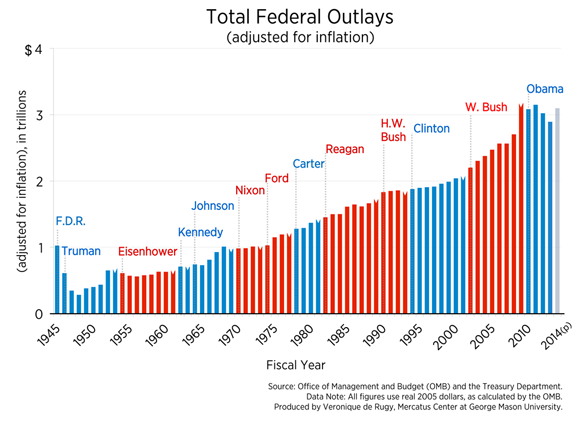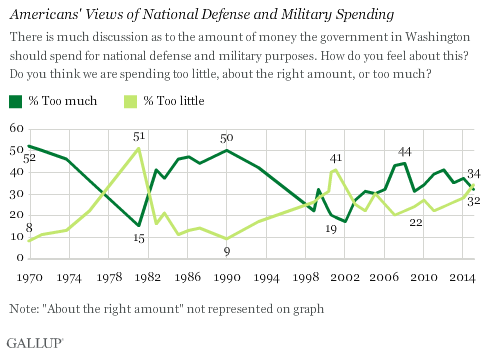Breaking: "The Gist" of Rand Paul's Controversial Defense Budget Amendment 940
More than ever, we need a strong voice to argue that $600 billion is more than enough to secure the safety and security of U.S. citizens and interests.

As noted earlier, Sen. Rand Paul (R-Ky.) submitted a budget amendment calling for increased defense spending in fiscal years 2016 and 2017. As Time originally reported, the amendment called for increasing spending by a total of about $190 billion over those two years, or a 16 percent increase over current totals.
While the specific language of the amendment is not yet available, the senator's office has sent me the following summary of its provisions:
Background information on Paul Amdt 940:
Sen. Paul has offered an amendment to increase the levels of national defense spending (budget function 050) in both 2016 and 2017. The levels reflect the projected FY2016 levels, before BCA caps became law.
Amdt. 940 will increase, defense spending by nearly $190 billion over the next two years. This amendment continues to fulfill the President's OCO request and mandatory defense spending.
In the proposed amendment, Sen. Paul provides an increase in defense spending with offsets from the following accounts:
• $21 billion from Foreign Assistance accounts (budget 150 function)
• $14 billion from the National Science Foundation and Climate Change research under the General Science, Space, and Technology (budget 250 function)
• $10 billion total from the Environmental Protection Agency and Department of Commerce activities under Natural Resources and Environment (Budget 300 function) and Commerce and Housing Credits (Budget 370 function)
• $20 billion from Department of Education
• $41 billion in discretionary spending from the Department of Housing and Urban DevelopmentThese reductions would occur in both FY2016 and FY2017.
Those cuts in other areas come to $106 billion annually. According to the senator's office, the key gesture here is to pay for the increased spending by cuts made elsewhere in the budget.
That's something that other Republican proposals fail to do. As senior advisor Doug Stafford wrote me earlier today:
This amendment is to lay down a marker that if you believe we need more funding for national defense, you should show how you would pay for it. We can't just keep borrowing more money from China to send to Pakistan. And we can't keep paying for even vital things like national defense on a credit card.

Sen. Marco Rubio (R-Fla.) has proposed an amendment to increase spending by about the same amount as Paul's, but Rubio's plan specifies no offsets in spending, says Bloomberg Politics' Erik Wasson. Like Paul, Rubio is a presumptive candidate for the GOP presidential nomination. According to various reports, declared candidate Sen. Ted Cruz (R-Texas) has signed on to Rubio's plan and voted for its passage.
So in this narrow sense, one can see meaningful difference between Paul and his fellow Senate colleagues: He is willing to pay for increases in defense spending by stipulating cuts elsewhere. And it's worth pointing out that his insistence on trimming foreign aid by $21 billion has already raised the ire of the American Israel Public Affairs Committee (AIPAC).
Yes, it's great news that Paul is serious about debt and deficit in a way that escapes Cruz and Rubio—and virtually all Republicans, especially when it comes to Pentagon spending.

But there remains a serious question about reducing the size, scope, and spending of government. Real federal outlays spiked massively under George W. Bush and a Republican Congress. They spiked under Bush and a Democratic Congress too. They spiked even more under Barack Obama and a Democratic Congress and then flattened temporarily not out of any commitment to restraint but because of government incompetency. Expenditures are back on their way up, as both parties have constituents they want to reward after the briefest of timeouts.
In this context, Rand Paul's full-throated argument for reducing federal spending overall and specifically on defense was nothing less than exceptional (that it was clearly in tune with the vox populi is less important). It's true that popular opinion toward U.S. military spending and involvement around the world shifted last fall in response to the beheadings of Americans by the Islamic State, aggressive actions by Vladimir Putin, and a bizarre turn of events that has the United States effectively fighting side by side with Iran and Syria in Iraq. The war impulse is especially strong among Republicans, of whom 56 percent say the U.S. is "spending too little" on defense. In Congress and the op-ed pages of the country, there is no shortage of right-wing hawks who want to see the U.S. flex its muscles in the Middle East, Russia, and elsewhere.
However, it's precisely this new, pro-war context that makes Paul's call for increased defense spending, even if paid for, more frustrating.
Now more than ever, the country needs a strong and unambiguous voice to argue that $600 billion is far more than enough to secure the safety and security of U.S. citizens and interests. If anything, we seriously need to be talking about cutting down the drag that debt-financed military spending puts on the economy and, more important, the awful outcomes the past dozen years of U.S. foreign policy has visited not just upon our armed forces but people around the globe.
The current war fever—half of Americans think we're heading back into the Cold War, fer chrissakes—will break soon enough once Americans recognize that buying more useless weapons systems and going deeper into debt to keep defense contractors happy is no way to win the future. We Americans are fickle, yes, but we're not so stupid as to think going back into Iraq—or engineering a pro-Western coup in Iran, as Sen. Tom Cotton (R-Ark.) seems to want—makes a hell of a lot of sense. Nor are we so stupid as to think that absent ever-increasing defense spending, "Americans will die in great numbers" (as radio warrior Hugh Hewitt says).
With even a few more weeks passing, what will be revealed is that hawks always insist that it's the right time to double or triple or quadruple defense spending and to invade this or that country. Like blood-mad realtors hell-bent of selling houses, for them it's always a good time to buy buy buy. Their message is both consistent and consistently wrong. Does the 21st century prove nothing so much as the criminal stupidity of the Dick Cheneys and Donald Rumsfelds of the world, and that of all their towel boys at institutions such as American Enterprise Institute and Heritage Foundation? Anyone who looks back over the still-smoldering ruins of the past decade of American foreign policy folly and decides we need to stay the same course is unfit for intelligent conversation, much less elected office.
Rand Paul has captured the imagination of a large and growing number of conservatives (many of whom are also questioning the wisdom of being on a permanent war footing), libertarians and libertarian-leaning Republicans, younger people, and even liberals and Democrats precisely by speaking truth to the war power. Because of that, he will always be suspect to armchair warriors of the right who never think twice about sending young men and women to soak the ground of far-flung countries with their blood, or who never pause to break the back of the American economy in the pursuit of the next F-35 boondoggle.
It's to Rand Paul's immense credit that he, alone among even his Tea Party compatriots who were sent to the Senate to reduce federal spending, wants to pay for any and all increases in defense spending.
It will be better still, for the country and the wide, wide world, if Paul once again channels his earlier self and calls for a reduction in overall spending, including the reckless piling up of arms and men that have not advanced national security in any observable way.


Show Comments (76)